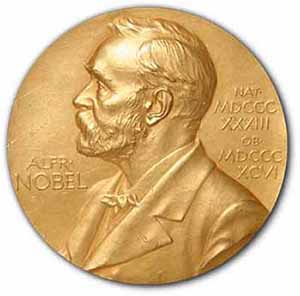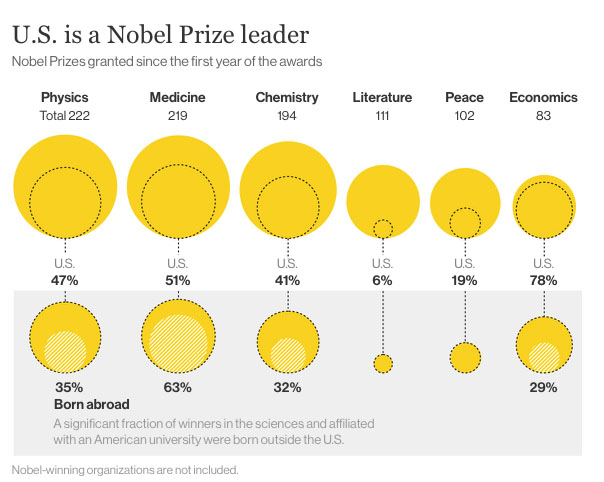
About the Nobel Prize Wikipedia

About the Nobel Prize Wikipedia
US economist Richard Thaler, one of the founding fathers of behavioral economics, has won this year's Nobel Prize for Economics. BBC - October 9, 2017
Prof Thaler, of the University of Chicago Booth, co-wrote the global best seller Nudge, which looks at how people make bad choices. It spawned "nudge theory" of how to help people make better life decisions. The Nobel prize panel said his work had contributed to an understanding of the psychology of economics.
Nobel Peace Prize awarded to the International Campaign to Abolish Nuclear Weapons (Ican) BBC - October 6, 2017
The Nobel Peace Prize has been awarded to the International Campaign to Abolish Nuclear Weapons (Ican). Berit Reiss-Andersen, the Nobel committee chair, said it was due to the group's "groundbreaking efforts to achieve a treaty prohibition" on nuclear weapons. "We live in a world where the risk of nuclear weapons being used is greater than it has been for a long time," she continued. She cited the North Korea issue. In July, after pressure from Ican, 122 nations backed a UN treaty designed to ban and eventually eliminate all nuclear weapons. But none of the nine known nuclear powers in the world - including the UK and the US - endorsed it. Ms Reiss-Andersen called on nuclear-armed states to initiate negotiations to gradually eliminate the weapons. Ican, a coalition of hundreds of non-governmental organisations (NGOs), is 10 years old and is based in Geneva, Switzerland. The group will receive nine million Swedish kronor ($1.1 million, £846,000) along with a medal and a diploma at a ceremony in Decemb
Nobel Prize in Literature awarded to Kazuo Ishiguro BBC - October 5, 2017
The novelist was praised by the Swedish Academy as a writer "who, in novels of great emotional force, has uncovered the abyss beneath our illusory sense of connection with the world". His most famous novels The Remains of the Day and Never Let Me Go were adapted into highly acclaimed films. He was made an OBE in 1995. The 62-year-old writer said the award was "flabbergastingly flattering". He has written eight books, which have been translated into over 40 languages.
Nobel Prize in Chemistry awarded for imaging biological molecules like viruses BBC - October 4, 2017
Jacques Dubochet, Joachim Frank and Richard Henderson will share the nine million kronor (£831,000) prize. They were named at a press conference in Stockholm, Sweden. They developed a technique called cryo-electron microscopy (cryo-EM), which simplifies the process for looking at the machinery of life. The process makes it possible for life's molecular building blocks to be captured mid-movement and allowed scientists to visualise processes that had never before been seen.
Prof Dubochet was born in Switzerland, Joachim Frank is German and Richard Henderson is from Edinburgh, UK. Speaking to journalists over a telephone line, Prof Frank said the practical uses for the technique were "immense". And the Nobel committee said the work had "moved biochemistry into a new era". Committee chair Sara Snogerup Linse explained: "Soon, there are no more secrets, now, we can see the intricate details of the biomolecules in every corner of our cells and every drop of our body fluids. "We can understand how they are built and how they act and how they work together in large communities. We are facing a revolution in biochemistry." Cryo-electron microscopy has been used to capture images of Salmonella's "injection needle" for attacking cells, proteins involved in antibiotic resistance and the molecular structures governing circadian rhythm - the subject of this year's medicine and physiology Nobel.
Nobel Prize in Physics awarded for detection of Einstein's gravitational waves BBC - October 3, 2017
Rainer Weiss, Kip Thorne and Barry Barish will share the nine million kronor (£831,000) prize. The ripples were predicted by Albert Einstein and are a fundamental consequence of his General Theory of Relativity. The winners are members of the Ligo-Virgo observatories, which were responsible for the breakthrough. The winners join a prestigious list of 204 other Physics laureates recognized since 1901. Prof Weiss gets half of the prize money, while Barish and Thorne will share the other half. Gravitational waves describe the stretching and squeezing of space-time that occurs when massive objects accelerate. The warping of space resulting from the merger of two black holes was initially picked up by the US Ligo laboratory in 2015 - the culmination of a decades-long quest. Three more examples have been detected since then.
Nobel Prize for Physiology or Medicine - Body Clock or Circadian Rhythm BBC - October 2, 2017
The body clock - or circadian rhythm - is the reason we want to sleep at night, but it also drives huge changes in behavior and body function. The US scientists Jeffrey Hall, Michael Rosbash and Michael Young will share the prize. The Nobel prize committee said their findings had "vast implications for our health and wellbeing". A clock ticks in nearly every cell of the human body, as well as in plants, animals and fungi. Our mood, hormone levels, body temperature and metabolism all fluctuate in a daily rhythm. Even our risk of a heart attack soars every morning as our body gets the engine running to start a new day.

Nearly 900 People Have Won Nobel Prizes. Only 48 Were Women - National Geographic - October 10, 2017
Since the first awards in 1901, fewer than 900 individuals have received Nobel Prizes. As the latest laureates join the hallowed host this week, National Geographic wanted to get to know them all better. (Find out more about the secretive process behind the Nobel Prizes.) Using the Nobel Foundation's detailed datasets from 1901 to 2016, we break down the winners of the world's best-known awards.
Where are the female Nobel Prize winners? BBC - October 8, 2017
The 2017 Nobel season is still under way, with the prizes for peace, and economics yet to be announced. But for the sciences, this year's work is done and many in the scientific community are noticing some similarities about the winners.
Nobel Prizes 2017: Facts About the Secretive Process and Peculiar Past National Geographic - October 2, 2017
Intended to recognize scientists, artists, and diplomats who work to improve life for all humanity, the prizes were established in 1895 at the bequest of Swedish inventor and businessman Alfred Nobel. Though Nobel carried his rationale for each prize category into the grave, in life, he had a keen interest in physics, chemistry, medicine, and literature - four of the five original prize disciplines. The committees responsible for choosing prize recipients do so under strict rules of secrecy, and originally the proceedings were meant to be kept private forever, says Gustav Kllstrand, curator of the Nobel Museum in Stockholm and a Nobel history expert. Now, details of the process for each round of consideration are kept secret for only 50 years.